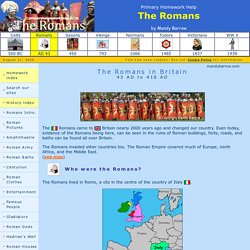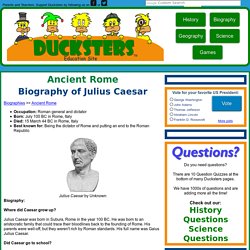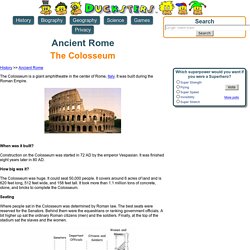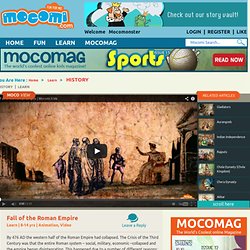

BBC clips Romans. Romans conquer Britain. Facts about Roman History. The Romans came to Britain nearly 2000 years ago and changed our country.

Even today, evidence of the Romans being here, can be seen in the ruins of Roman buildings, forts, roads, and baths can be found all over Britain. The Romans invaded other countries too. The Roman Empire covered much of Europe, north Africa, and the Middle East. The Romans lived in Rome, a city in the centre of the country of Italy One day, some years before Jesus Christ was born, the Romans came to Britain.
Britain before the Romans (The Celts) Who founded Rome? When did the Romans invade Britain? Why did the Romans invade Britain? How many times did Julius Caesar try to invade Britain? Rome Burns. The capital of a great empire, Rome was a center of art and culture that spanned hundreds of years.

It was also the home city of a long series of emperors who ruled the Mediterranean. One of these was a man named Nero. A ruthlessly ambitious man, Nero came to the throne at age 16 with big plans. After allegedly killing his own mother, Nero proposed a plan to tear down a third of the city and build a series of palaces that he wanted to call Neropolis. The Roman senate, which retained power even though the land was ruled by an emperor, refused to agree to the building project. On July 18, 64 A.D., a fire broke out in Rome’s chariot stadium.
History has blamed Nero for the fire, and it certainly gave him what he wanted—he took the opportunity to begin building a huge palace where part of the city had once stood. Julius Caesar is assassinated. Biographies >> Ancient Rome Occupation: Roman general and dictator Born: July 100 BC in Rome, Italy Died: 15 March 44 BC in Rome, Italy Best known for: Being the dictator of Rome and putting an end to the Roman Republic Julius Caesar by Unknown Biography: Where did Caesar grow up?

Julius Caesar was born in Subura, Rome in the year 100 BC. Did Caesar go to school? At around the age of six, Gaius began his education. Becoming an Adult. Roman Invasions of Britain. Who was Julius Caesar? Julius Caesar. Emperor Claudius. Roman Empire Timeline. Roman Empire - The Roman Timeline. Timeline - Romans leave Britain. The Colosseum. History >> Ancient Rome The Colosseum is a giant amphitheatre in the center of Rome, Italy.

It was built during the Roman Empire. When was it built? Construction on the Colosseum was started in 72 AD by the emperor Vespasian. It was finished eight years later in 80 AD. How big was it? The Colosseum was huge. Seating Where people sat in the Colosseum was determined by Roman law. Seating inside the Colosseum was according to social status Emperor's Box The best seat in the house belonged to the emperor who sat in the Emperor's Box. Underground Passages Below the Colosseum was a labyrinth of underground passages called the hypogeum. Construction The walls of the Colosseum were built with stone. Inside the Colosseum Colossus Outside of the Colosseum was an enormous 30 foot bronze statue of the emperor Nero called the Colossus of Nero.
Hadrian's Wall. Ealy Rome. Boudicca Rebellion. Boudicca's story. Fall of the Roman Empire. By 476 AD the western half of the Roman Empire had collapsed.

The Crisis of the Third Century was that the entire Roman system – social, military, economic –collapsed and the empire began disintegrating. This happened due to a number of different reasons: Unrest among common people: Roman society was divided into free persons and slaves. The slaves had no rights and had to work very hard for their masters. This caused unrest among them. Taxes: As the empire expanded, more and more people had to be conscripted into the army.
Barbarians: The Romans called everyone outside the Roman Empire barbarians and thought they lacked culture and morals. Christianity: the rise of Christianity made people believe that a peaceful life of service was possible and they did not want the join the army. Praetorian Guards: the Praetorian guards were a special class of soldiers encamped within Rome charged with protecting high-ranking officials in the city. End of the Roman Empire.